China has become the most critical market worldwide for key opinion leaders (KOLs for short, also known as "influencers"). To be more precise, it’s the most important market for luxury brands to find, select, and connect with the right KOL. This is still quite a challenge for many Western companies that are trying to market to Chinese consumers. But why do Chinese consumers rely so much on influencers in the first place? The answer can be broken down into three main reasons.
First, China is the youngest and most digital-oriented luxury market. Consumers get most of their information about brands from Chinese social platforms like WeChat, and the nature of those platforms makes it more likely that consumers in China will connect with influencer content than in other countries in which websites and reviews play more prominent roles. Plus, firewalled platforms like WeChat make it difficult for brands to connect directly with consumers on social media — so KOL-driven content gives them much more visibility.
Second, Chinese consumers go to social media ahead of any other type of platform to make their luxury purchase decisions. They’ve grown comfortable with receiving guidance from influencers they follow, even if they know that all of the most relevant KOLs have highly paid contracts with large international brands like Christian Dior, Estée Lauder, or Gucci, to name a few. It’s all about emulating the lifestyle of their idols, following their advice, and becoming part of their communities.
Third, many Chinese consumers are still relatively new to the luxury market. They’re looking for guidance and typically trust KOLs more than the information they receive directly from brands.
To recap, influencers give consumers direction, inspiration, and curation. They help them to navigate through the quickly changing luxury market — to know which items are “hot,” which sneakers are coolest, or which bag or jacket is best. A KOL's influence goes far beyond the celebrity endorsements that western brands like Rolex or Aston Martin have used over the decades in Western markets. By following a KOL, consumers receive all types of appropriate advice, such as how to dress in a specific situation or which hotel is best to stay in on a specific vacation. While Western celebrity endorsements seem to simply connect their image to a brand, KOLs bring brands into particular and personal contexts. That is their greatest power in influencing Chinese consumers.
How then, you may ask, should luxury brands select the right influencer? The most important aspect is how a brand’s equity and market positioning fits with the influencer’s image. This sounds logical, but I’m surprised at how few brands have systems in place to help them make these selections in a precise, risk-averse way. The first step is understanding how Chinese consumers see the brand, which in turn requires brand audits combined with advanced consumer listening capabilities that dig deeper than the relatively closed-off Chinese social media networks. Similarly, this exercise should be done with a group of potential influencers to learn who is following them, how they are seen, and which conversations they’re connected to. In the end, the brand has to match the influencer.
Once a match is found, the right content strategy needs to be developed. Then the brand should use AI-based data analytics to measure exactly how the influencer campaign is resonating with consumers by tracking actual sales back to the influencer. An integrated data ecosystem ultimately lets the brand evaluate if it has chosen the right influencer or created the right communication content.
Given the importance of KOLs in China, it’s surprising that companies rely more on gut feeling when selecting influencers and content rather than data-driven decision-making. KOLs aren’t just “nice to have” in China — they’re one of the most important marketing tools in the country today, and as such, they need to be managed much more precisely than most brands realize.
Daniel Langer is CEO of the luxury, lifestyle and consumer brand strategy firmÉquité. He consults some of the leading luxury brands in the world, is the author of several luxury management books, a regular keynote speaker, and holds management seminars in Europe, the USA, and Asia. Follow @drlanger


